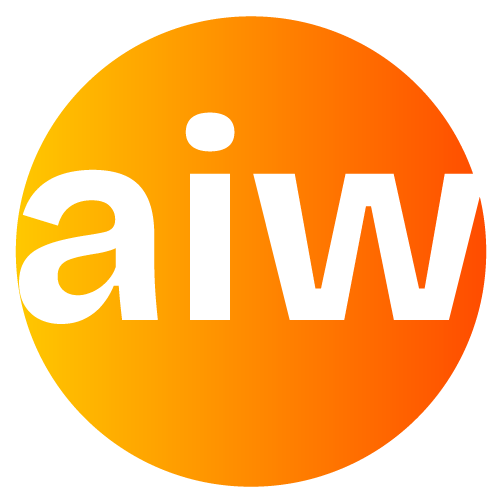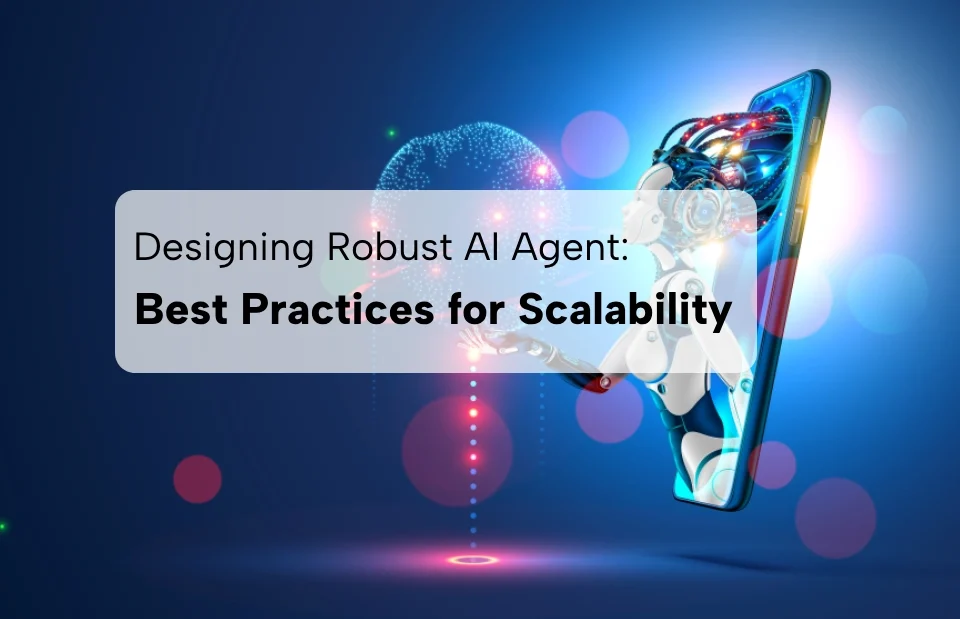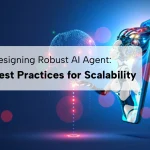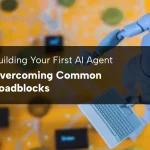In a competitive and fast-paced business landscape like the United States, operational delays can mean the difference between profit and loss. Workflow bottlenecks like multi department purchase approvals, sales lead qualification across multiple CRMs, or delayed onboarding sequences for new hires can cost companies valuable time and resources.
To tackle these challenges, a growing number of businesses are adopting AI Agents for Business Productivity. These intelligent systems do far more than automate tasks. They learn, adapt, and drive smarter, faster decisions. But before implementing, it’s essential to understand what are AI Agents, how they work, and how they fit into your business operations.
Key Takeaways
- AI Agents reduce repetitive manual work, increasing efficiency across teams
- The best AI agents are custom-built to solve specific workflow bottlenecks
- Companies using AI Agents report up to 40% productivity improvements
- Understanding How to Create AI Agents is critical to long-term automation success
- There are compelling Examples of AI Agents in every major industry
- Choosing the right AI agents frameworks ensures scalable performance
Table Of Contents
- What Are AI Agents and Why Are They Critical?
- Where bottlenecks happen—and why AI Agents are the solution
- Real Examples of AI Agents in Business Use
- How to create AI Agents that fit your workflow
- Best AI Agents: Custom vs. Pre-built
- Selecting the Right AI Agent framework
- Why AI Agents for business productivity are a strategic investment
- How AI Agents Are Reshaping the American Workforce
- Why work with AI Workfllow?
- Ready to Eliminate Bottlenecks with AI Agents?
- Frequently Asked Questions
What Are AI Agents and Why Are They Critical?

What Are AI Agents?
Simply put, they are intelligent software programs that perform tasks autonomously. These agents can understand workflows, make real-time decisions, and learn from historical data to improve over time. Unlike traditional automation tools, AI Agents are context-aware and adaptive.
They help organizations move from static process automation to intelligent, dynamic task execution. Whether it’s routing customer queries or processing HR paperwork, AI Agents bring consistency, speed, and insight to your operations.
Where bottlenecks happen—and why AI Agents are the solution
Workflow bottlenecks occur when a process stalls or slows down due to inefficiencies. These are often hidden in daily operations—like manual form approvals, data lookups, or misrouted tickets. In the U.S. alone, workflow inefficiencies cost companies billions each year in lost productivity and customer dissatisfaction.
By integrating AI Agents for business productivity, these bottlenecks are eliminated or drastically minimized. AI Agents analyze process flows, anticipate delays, and even trigger proactive measures before issues escalate.
Real Examples of AI Agents in Business Use
Seeing real-world results helps underscore the power of AI. Here are three compelling Examples of AI Agents delivering ROI across different industries.
- In the retail sector, a major U.S. chain used AI Agents to forecast demand and automate inventory replenishment. Stockouts reduced by 25%, and inventory holding costs dropped by 18%.
- A telecom company deployed an AI Agent to manage Tier-1 customer service tickets. The system responded to 80% of queries instantly, cutting average response time from 5 minutes to under 30 seconds.
- In healthcare, a network of clinics integrated AI Agents into their patient scheduling systems. Appointment no-shows fell by 30%, and patient satisfaction metrics improved within weeks.
How to create AI Agents that fit your workflow
Learning How to Create AI Agents tailored to your business model is vital. While many platforms offer off-the-shelf tools, the best outcomes come from custom-developed agents that align with specific use cases.
Start by mapping out key workflows. Identify tasks that are repetitive, rule-based, or bottleneck-prone. Once mapped, determine where decision points exist. AI Agents thrive in environments where data and rules govern outcomes.
Next, define integration points – where will your agent pull data from? CRMs, ERPs, and internal databases are all viable sources. After integration, train the agent using historical data so it can learn to handle variations and exceptions.
Best AI Agents: Custom vs. Pre-built
Choosing the best AI agent depends on business maturity, operational needs, and tech readiness. Off-the-shelf AI Agents can work well for simple, repetitive tasks that are common to most businesses. However, they fall short when processes are nuanced or require domain-specific intelligence.
Custom-built AI Agents, on the other hand, offer strategic advantages. They’re designed with your rules, data models, and team workflows in mind. This personalization ensures better adoption, less manual intervention, and long-term ROI.
Companies serious about eliminating workflow bottlenecks typically choose custom development because it aligns the AI Agent’s logic with business objectives.
Selecting the Right AI Agent framework
Behind every effective AI Agent is a reliable architecture. That’s where AI agents frameworks come in. These frameworks determine how flexible, scalable, and context-aware your agents will be.
Popular frameworks include:
- LangChain, for reasoning tasks and multi-step workflows
- CrewAI, perfect for managing multiple agents with distinct roles and collaborative goals
- Python, the foundational language for building custom logic and integrating AI libraries
- Flowise, a no-code visual builder for designing and deploying agent workflows with speed
- Microsoft Semantic Kernel, built for enterprise-grade orchestration
Choosing the right AI agents framework can make or break your deployment. Each has strengths depending on your use case—whether customer service, operations, finance, or logistics.
Why AI Agents for business productivity are a strategic investment
Deploying AI Agents for your business is not a luxury—it’s becoming a competitive necessity. These agents provide a scalable workforce that operates around the clock, error-free, and without fatigue.
Consider the financial impact – a mid-sized company might save thousands of work hours annually simply by automating approvals and data entry. Meanwhile, employees are freed to focus on strategic initiatives—driving revenue instead of handling repetitive tasks.
The long-term benefit is not just cost savings but a stronger, faster, and more agile organization.
Performance Metrics: Measuring AI Agent Impact
Once implemented, AI Agents should show measurable impact across key metrics:
- Task turnaround time
- Error rates in data processing
- Customer satisfaction and NPS scores
- Ticket resolution time
- Revenue lift or cost reduction
Tracking these metrics helps determine if you’re working with the best AI agents and whether your framework is performing as intended. In our client experience, ROI begins to show within 90 days of full deployment.
Implementation Best Practices
The path from AI idea to AI execution involves discipline. Start small with a focused pilot. Choose a workflow that’s high-volume and well-documented. This allows the agent to learn faster and deliver early wins.
Next, collaborate across departments. AI should not be an IT-only initiative. Involve operations, compliance, and end users early.
Finally, retrain and refine your agent periodically. This ensures it stays aligned with evolving business logic and regulatory updates.
How AI Agents Are Reshaping the American Workforce
In the U.S., businesses are reimagining job roles around AI Agent integration. Instead of replacing workers, AI Agents support them. Repetitive, low-value work is automated, while employees focus on tasks that require creativity, critical thinking, and human connection.
Leaders are beginning to embed AI Agents into workforce strategies. For instance, operations teams now rely on AI Agents for real-time decision support, while marketing departments use them to generate customer insights from millions of data points.
Understanding How to Create AI Agents and align them with your workforce vision is a key component of futureproofing.
Why work with AI Workfllow?
Choosing the right partner is just as important as choosing the right technology. At AI Workfllow, we go beyond just building automation tools—we architect intelligent systems that solve real-world business problems.
We specialize in delivering the best AI agents for organizations with complex, high-volume workflows. Whether you’re looking to streamline a single approval process or transform an entire operational backbone, AI Workfllow offers end-to-end support—strategically and technically.
Our team blends deep expertise in AI engineering, business process re-engineering, and vertical-specific consulting to ensure your AI initiative is successful from day one.
What We Deliver:
- Workflow Assessment
We analyze your current operations to identify bottlenecks, map decision points, and uncover opportunities where AI Agents can deliver the greatest impact. - Custom AI Agent Development
We don’t believe in one-size-fits-all. Our agents are built to match your exact use case, data flow, rules, and operational logic—ensuring maximum relevance and ROI. - Framework Selection and Integration
Whether it’s LangChain, OpenAI, or Microsoft’s Semantic Kernel, we guide you through the most suitable AI agents frameworks based on your architecture, goals, and scalability requirements. - Continuous Performance Optimization
AI Agents evolve—and so do your business needs. We provide regular updates, retraining, and refinements to ensure sustained performance over time.
At AI Workfllow, we don’t just hand over a tool—we become an extension of your innovation team. Our clients in healthcare, financial services, manufacturing, and retail consistently see measurable improvements in productivity, cost-efficiency, and customer experience.
If you’re serious about using AI agents to eliminate workflow bottlenecks and gain a competitive edge, AI Workfllow is the partner that brings clarity, capability, and results.
Ready to Eliminate Bottlenecks with AI Agents?
The future belongs to businesses that can move fast, adapt quickly, and scale intelligently. Integrating AI Agents for Business Productivity is the first step. Whether you’re exploring What Are AI Agents, trying to identify the best AI agents, evaluating AI agents frameworks, or learning How to Create AI Agents, AI Workfllow is your trusted partner.
Frequently Asked Questions
What Are AI Agents in simple terms?
AI Agents are intelligent software tools that perform tasks without constant human input. They understand the context of tasks, make decisions, and learn from experience. Unlike simple automation, they adapt to complex workflows and help streamline operations like support, finance, and HR.
How do I choose between prebuilt and custom AI Agents?
Prebuilt AI Agents are ideal for basic, repeatable tasks. For complex systems, integrations, or business-specific rules, custom AI Agents are more effective. AI Workfllow helps assess your workflows and recommends the best approach based on scale, complexity, and return on investment.
Are there specific frameworks for creating AI Agents?
Yes. Leading AI agents frameworks include LangChain, CrewAI, Python and Flowise. Each supports different business needs—from automation to conversational AI. AI Workfllow helps you choose and implement the right framework for your business environment.
What’s the typical ROI timeline for AI Agents?
Most businesses see returns within 3–6 months of launching AI Agents. Common benefits include faster task handling, fewer errors, and reduced manual effort. AI Workfllow clients often report 30–40% productivity boosts and cost savings soon after deployment.
Can you show more Examples of AI Agents in real businesses?
Absolutely. AI Workfllow has delivered AI Agents across finance, telecom, healthcare, and retail. Here are some standout use cases:
Finance: An AI Agent that tracks regulatory updates across jurisdictions and flags relevant changes for compliance teams
Telecom: A provisioning agent that autonomously configures new user accounts, SIM activations, and tier upgrades in real-time
Healthcare: A patient intake agent that extracts key data from insurance forms and clinical records to reduce onboarding time by 60%
Retail: A replenishment agent that monitors POS data, predicts demand spikes, and automates supplier orders to avoid stockouts
Logistics: A routing agent that adjusts delivery schedules based on real-time weather, traffic, and warehouse availability
B2B SaaS: An onboarding concierge agent that guides new customers through setup and schedules their first success call
Contact us to view case studies specific to your industry and goals.

Dhruv Dholakia has spent over a decade helping enterprises streamline operations through workflow automation and digital transformation. With a strong belief in building purposeful tech, he now focuses on the next frontier—custom AI solutions and Agentic AI. For Dhruv, AI isn’t just a buzzword; it’s a tool to solve real-world problems and create lasting impact. He’s passionate about making AI accessible, responsible, and truly useful for people, teams, and businesses navigating today’s fast-changing world.





